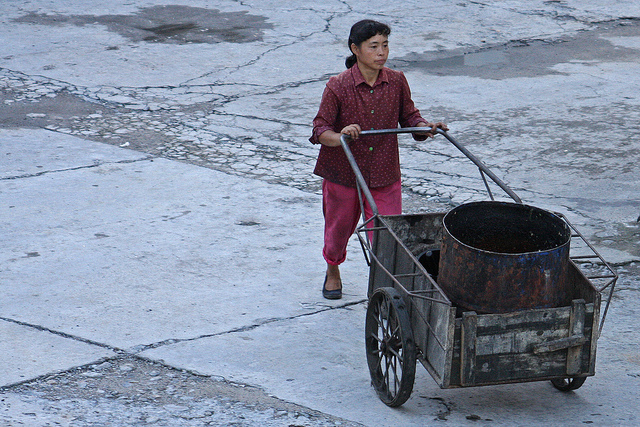North Korea, could be described as a uniquely politicized country. A nation that probably knows more about the outside world, than what the outside world knows about them. North Korea, a land still largely masked in secrecy, is a place that is intriguing, and a country that curious minds want to know more about. However, for people like “Mr. Kim,” it would represent a land of oppression. A regime that would be responsible for his horrifying two years as a slave.
In 2013, Hollywood produced a film called “12 Years a Slave.” A true story starring Chiwetel Ejiofor, who played Solomon Northup, a free black man from upstate New York. He was abducted and pushed into slavery, in the deep south. There, he became exposed to the cruelty of a malicious slave-owner. A story that Mr. Kim could relate to easily.
This man goes by the name, Mr. Kim because he is terrified that stating his real identity would put his family in danger. They are in North Korea. For the past thirteen years, Mr. Kim has been on the run. However, it is not North Korea that he is running from. It is the cruelty, seclusion, and continuous hard work he endured daily, as a bonded laborer, in Russia.
The Forced Labor from Hell
Mr. Kim is only 1 of 50,000 North Koreans that are forced to work in foreign nations. These countries not only push them to work in harsh and dirty conditions, but they are encouraged by the North Korea Regime, to make it as uncomfortable as possible.
Pyongyang, the capital of the Democratic People’s Republic of Korea, handles all the laborer’s contracts. At the same time, they keep workers in the dark concerning the details.
Mr. Kim made between 110 and 135 euros, which is the equivalent of $120 and $150. However, he barely saw any of it. “They practically took it all,” expressed Mr. Kim. “Almost 95 percent of my salary went straight to the North Korean administration,” he continued. He is not alone. The Pyongyang rule is using external workers as a means to pay off debts owed by North Korea.
His nightmare began when he applied for a job abroad through his company in North Korea. “I did it because my family was hungry and I was not making enough money to feed them,” Mr. Kim said. At the time, earning $130 in Russia seemed like a dream come true, however, those hopes would be shattered once he relocated.
Thousands of Years of Slavery
Slavery is not unfamiliar to North Korea. In contemporary South Korea, the practice of slavery is now prohibited. However, forms of slave-owning, such as human trafficking, are still present. Yet, North Korea is the opposite and slaveholding is still practiced by the republic’s government.
Approximately 2,000 years ago, before the Silla era, slavery was on the rise in Korea. It was decreased during the 10th century. Slave labor regained power during the Koryo age, which brought in a caste system. This classification enslaved a group known as the nobi, which were a similar class to the serfs.
Serfdom was a condition of slaveholding, which advanced primarily throughout the Middle Ages in Europe, but the Koreans had their system. Serfs grew crops.
This system forced 37 percent of the population into this custom and they became the lowest social class of Korean society. By 1858, the escape of many slaves, a population increase, and changes to the agricultural economy led to the fall of the Korean caste system. In 1886, this form of classification was eliminated, but not for long.
According to The Korea Herald, North Korea, ranks 43rd, with 108,200 individuals projected to be enslaved. North Korea has also been included in the list of countries that are “not being pro-active against modern slavery,” according to the Australia’s Walk Free Foundation. North Korea is not alone, standing alongside them are nine other nations, such as Syria and Iran.
There are many Mr. Kims’ that are being enslaved in countries such as India. In 2014, India was listed as the 49th nation on the Global Slavery Index list. They had more than 14 million children and adults involved in present-day slavery.
Ranked second is China, with a population of 3,241,400 people yoked in bondage. They are followed by Pakistan’s 2,058,200 enslaved individuals.
The Plight of the Unsung
Before Mr. Kim’s predicament, there was a North Korean woman named Ji Hyunah. Her nightmare started in 1998, under Kim Jong-un’s regime, when she was sold as a slave, in North Korea. While there, she was forced to commit unspeakable horrors. Some of these terrors involved her being sold for sex and forced to have abortions without anesthesia.
Her first enslavement involved, being sold as a bride to a senior woman in China. Hyunah would be a present to the woman’s son. However, by the time she arrived, the son had left China to work in Japan.
“It hurt that I was being marketed,” Hyunah said. “Every time they talked on the phones, the brokers got nervous because they thought the calls were tapped. But then again, I believed that it is better to be here in China than back in North Korea.”
In 2007, she was able to escape to Seoul, South Korea and since then, she has been able to help her family escape. For Mr. Kim, he would not have the fortune to relocate his family out of North Korea without risking their lives.
Mr. Kim worked an average of 16 hours a day. There were times when he worked as many as twenty consecutive hours. He finally reached his breaking point. The work was more than what he could handle. By 2002, he took the first available opportunity to escape.
The Escape
He waited until all the administrators from North Korea had gathered together in a factory meeting. Once the coast was clear, he ran away unnoticed. He was able to save some money over to purchase a train ticket. Mr. Kim hid in a different Russian city where no one knew him and continued working on construction projects as a manual laborer.
He decided to leave for South Korea, in 2013, where he has never left. Mr. Kim is in a more positive position than other escapees. The North Korean leadership is unaware of his getaway because North Korean securities did not report his departure. He expressed that if they had done so, they would have been reprimanded.
However, it may not look so good for his family, still in North Korea. “If they ever found out that I escaped, the consequences could be unbearable.” People like Mr. Kim and Hyunah appear to be significant spokespersons against slavery in East Asia. For Mr. Kim, living in North Korea for two years as a slave was nothing like a Hollywood production. The reality is a horror story that has been isolated from the rest of the world.
By Jomo Merritt
Edited by Jeanette Smith
Sources:
The Telegraph: Escape from North Korea: ‘I was sold into slavery and forced to have an abortion’
ABC News: North Korea’s Kim Jong-un exporting 90,000 slave laborers worth $2 billion to fund nuclear program
Reuters: Almost 46 million people trapped in slavery with North Korea, India key offenders: global index
Image Courtesy of Roman Hawak’s Flickr Page – Creative Commons License





![Adolf Hitler and Donald Trump Similarities Will Lead to What Outcome? [Update]](https://futurepreviews.com/wp-content/uploads/2017/01/Screen-Shot-2017-01-12-at-7.29.12-PM-500x383.png)

